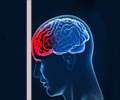To support the need for a blood test to diagnose brain injury in the United States, scientists are scrambling to gather data for the FDA.
To support the need for a blood test to diagnose brain injury in the United States, scientists are scrambling to gather data for the FDA. The University of Rochester Medical Center just added significant evidence by reporting in the
Journal of Neurotrauma that it might be clinically useful to measure two brain biomarkers instead of one.
Jeffrey J. Bazarian, M.D., M.P.H., an associate professor of Emergency Medicine at URMC, believes he's the first to show that measuring a combination of two proteins released into the bloodstream after a head injury might be the best way to diagnose a mild traumatic brain injury. The protein S100B is already routinely used as screening tool in several countries in Europe and Asia.But when researchers analyzed blood samples from 787 head injury patients (and compared them to 467 controls) at six upstate New York hospitals, including Strong Memorial, they discovered that a second protein called apoA-1 helps to most accurately classify the injury. Apoa-1 transports lipids and interacts with the blood-brain barrier in important ways following a concussion.
The study comes in the midst of a huge push to study every aspect of mild traumatic brain injury among war veterans, athletes, the elderly, and accident and assault victims. About 1.7 million cases are reported each year, although no objective diagnostic test exists.Instead doctors must rely on judgment and observations, based on reports from the patient or witnesses, which have been shown to be notoriously inaccurate.Heightened awareness of the long-term health consequences of head injuries prompted the U.S. Department of Defense to investment $26 million into research in 2010; the NFL invested $30 million in 2012. Bazarian has several studies in motion, with funding for the latest work provided by the New York State Department of Health, the Academic Health Center Consortium, and the Emergency Research Network of the Empire State (ERNIES).
Source-Eurekalert










